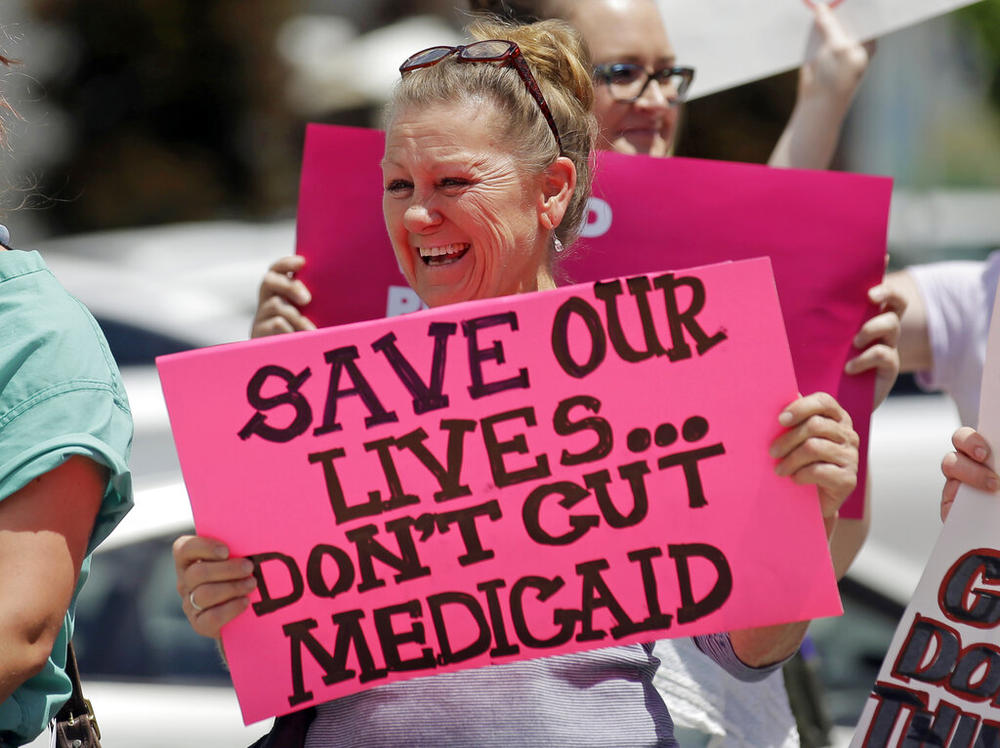
Caption
A woman holds a pink signs that says, "Save our lives ... don't cut Medicaid."
Credit: AP Photo/Rick Bowmer, File
LISTEN: Georgia children with health insurance, could soon lose coverage. GPB’s Ellen Eldridge reports on what the state could do to help.

A woman holds a pink signs that says, "Save our lives ... don't cut Medicaid."
Since 2020, the federal Health and Human Services Department declared COVID-19 public health emergency has allowed more people to qualify for Medicaid. States, including Georgia, received more federal funding.
The emergency status has since been renewed every three months, most recently on Oct. 13.
But that may soon run out if not renewed in January — and children may lose out.
Georgia has the fourth highest number of uninsured children, with an estimated 176,000 children going without health coverage, according to a Georgetown University Center for Children and Families analysis of U.S. Census Bureau data.
Georgia's one of six states nationwide at the greatest risk of having children lose their health insurance once federal protections end — and it performs poorly when compared to other states in the Deep South.
All of Georgia’s neighboring states — with the exception of Florida — have better child uninsured rates, according to a new report from Georgetown University Center for Children and Families.
Georgia has not implemented 12-month continuous eligibility for children in Medicaid/CHIP, which guarantees kids get a year of coverage once they are enrolled.
"And so what happens is some families get dropped after a just a few months and their kids go uninsured," said Leo Cuello, co-author of the report and a research professor at Georgetown University’s McCourt School of Public Policy.
That continuous coverage requirement has been an important support for Georgia households, especially low-income and Latino families, he said.
MORE:
For children, generally, the uninsured rate dropped from 7.4% in 2019 to 6.6% in 2021, Cuello said.
"And for Hispanic or Latino children, it dropped from 15.9% to 12.7%," he added. "That's, you know, almost a 20% drop. So a quite significant drop for that for that group."
Medicaid makes sure a child has access to primary and preventative care, which helps take pressure off emergency rooms.
CCF Executive Director Joan Alker said the rate of uninsured children in Georgia had been climbing before the start of the COVID-19 pandemic. But the rate reached its lowest level in history after pandemic-era protections took effect to prevent health coverage loss.
“It should not take a global pandemic for families to have an opportunity to access uninterrupted, reliable health care," Alker said. "Georgia must step up efforts to protect children’s coverage when the public health emergency protections lift. The buck will stop with the governor on this one.”
Children without health insurance have worse educational and health outcomes, the report shows, and their families can be exposed to large medical bills if a child goes without insurance even for a short period of time. But Gov. Brian Kemp has not chosen to expand Medicaid in the Georgia.
That's despite the federal government's current 90% matching rate.
"It's actually higher for Georgia in the initial years," Cuello said, "meaning the federal government would be paying more than 90% of the cost for Georgia to be expanding Medicaid. So it would be a phenomenal deal for the state to expand coverage and provide coverage to a large number of people."
Georgia's forthcoming implementation of express lane eligibility will allow the state to automatically enroll eligible children in Medicaid.
If a family applies for the SNAP program — known to many as food stamps — or the Temporary Assistance for Needy Families program — also known as cash assistance — the state would take the data that the families used in those applications to determine eligibility for Medicaid, Cuello said.
"And so a whole bunch of families who didn't actually apply for Medicaid, but are eligible and just haven't been enrolled, could be found and brought into the program," he said. "That's an example of a policy that will help coverage in Georgia."